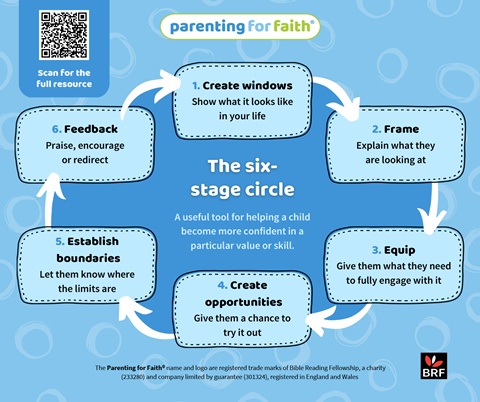Mark Griffiths and Rachel Turner’s monthly look at NexGen ministry

I have been in ministry for a long time, and one of the situations I find most frustrating is slow growth. You may encounter one of these situations at some point in your ministry too.
For months or years, you throw everything you can at a particular group to help them meet and know God – relevant topics, games, social times, testimonies – and yet you can feel like all of that barely makes any difference to their faith. The group may have grown in numbers or consistent attendance, and the young people may have flourishing friendships, but when it comes to the real fruit of lives changed by Jesus, you feel as if very little has happened.
When we reach this point as leaders, we can begin to fall into the trap of pursuing the Perfect Programme. ‘Surely,’ we think, ‘there is a format that will work – a right way to release these young people into the flourishing faith that God has for them.’ This mindset can lead us off the path of leadership and into the path of manipulation. We stop seeing the children and young people as loved disciples and begin to see them as subjects of a discipleship programme. One that is failing and that we will soon fix.
Self-improvement and strategic adjustment of our programmes are worthy and right parts of being a leader. But when you find your children or young people stuck in a slow spiritual growth rut, the question isn’t ‘How do I change my programme?’ but ‘What is hindering these children and young people from taking the next step in their faith?’
In Parenting for Faith, we talk about a six-stage circle of discipleship. It’s a natural thing everyone needs when being taught a new skill or way of thinking. If one of the stages is missing, it can be a hindrance in taking the next steps.
I am currently learning how to do blacksmithing. Random, I know, but I love it. My teachers are fantastic at bringing me along the six-stage circle.

Create windows
The first thing they do is create windows into their practice, so I can see what it looks like. Anything they want me to learn, they show me first. Multiple times. They show me on their forge, they pick up my piece and show me on mine. They encourage us to gather around and watch them work when they work on their pieces. We get a front-row seat at what creating looks like.
I learn so much from just watching them do it, even without explanation. I pick up how to angle the hammer or hold a piece of iron down. I see the colour of the fire and how they twist their wrist during the strike.
Children and young people need the same from us. We as leaders can often get so involved in delivering a programme that we forget that some of the most important things we can give are a front-row seat to an imperfect, authentic life with God. Children and young people need to see how Christians handle the ups and downs of life, how we deal with disappointment and struggle, and joy and hope.
They need to see us worship, pray, question and disagree – all with love. It could be that what is hindering our children and young people isn’t the programme but their need for greater access to authentic leaders who are willing to create appropriate windows into what a life lived with God really looks like in the everyday.

Framing
The second thing my blacksmithing teachers do is to explain everything to me. They explain how metal moves and why the fire works the way it does. I watched them swing a hammer a thousand times, but as soon as one of them said: “Swing from the shoulder, not the elbow!” my mind completely shifted. I saw it all differently. Things that may feel obvious to them are all new to me. I need them to create a framework for me to understand.
Children and young people need us to explain the obvious things because often no one has. How does prayer work? How do you know that God actually loves you? Why do we sing karaoke to an invisible God? Will God be annoyed if I’m mad at him? What is the point of attending church now when it didn’t matter in the pandemic? Sometimes our children and young people are stuck because we never explained to them the little foundations of the what and whys of a life lived with God.

Equip and create opportunities
The third and fourth feature of learning blacksmithing is that the instructors ensure we know how to do everything they ask. They don’t just tell us to “thin out the metal”. They equip us with the steps and what it will look like at each stage. Everything they ask us to do, they equip us for. Then they immediately put iron in our hands and send us to do it. We learn by doing, making mistakes, thinking it looks simple and then going horribly wrong. They come alongside us, coach us through fixing it and cheer us when we progress.
We can easily forget to equip the young people we are discipling. We ask them to worship without equipping them on how to prepare their hearts or connect with God in music. We tell them God is with them but don’t equip them how to connect with him when they are in the toilets at school or in bed at home. Sometimes our children and young people get stuck because it’s easy to engage when all they need to do is attend our programmes, but hard to do it outside our walls.
Maybe we need to pivot our focus from getting them to engage with our sessions and give them the skills to walk with God that fits their personality and lifestyle in their everyday. If we begin to give time to trying everyday skills out within our session times, they may begin to build the habits and patterns they need in the outside world. Patterns of listening to music on their own, writing in journals, looking up verses or praying on their own. What equipping and opportunities can we create in our sessions that empower them out of our sessions?

Boundaries and feedback
The fifth and sixth thing my blacksmithing teachers do is give us lots of freedom within boundaries and plenty of feedback when needed. The only way to learn is by trying and sometimes making mistakes, and having someone to debrief with who helps me see where my choices were brilliant, my progress is evident and where I went off the rails. The process is filled with acceptance, openness, affirmation and safety, even though I fail endlessly. Any judgement from others is quickly squashed.
Sometimes the spiritual growth of our young people gets stuck because we haven’t created a culture of vulnerable honesty about where we are spiritually, what we are struggling with, and an acceptance and celebration of each other’s journey. When our focus is on whether or not our sessions went well, we can miss the opportunity to create a culture where stories are told of ethical and moral dilemmas, struggles with God, questions, successes and failures.
Our children and young people need us to help them see the impact God has on their lives, the impact they have on others, and the affirmation of a community of companions committed to walking with them on the journey of faith and life. Mistakes are to be expected, as is the journey forward from them.
When you feel like your children and young people are stuck on a spiritual plateau, it may be that your programme needs to change. Or it may be that they are getting stuck on one of the stages and need some help taking their next steps. Don’t feel you need to push all at once frantically, just have a think through the circle and ask God to point to any stage that may be the hinderance for your children and young people.
The fruit is worth it!


































